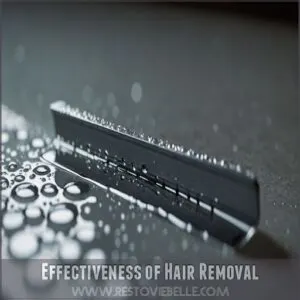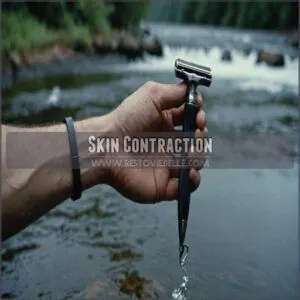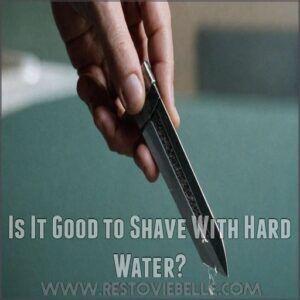This site is supported by our readers. We may earn a commission, at no cost to you, if you purchase through links.
 You’ll get different benefits whether you shave with hot or cold water – it’s not a one-temperature-fits-all situation.
You’ll get different benefits whether you shave with hot or cold water – it’s not a one-temperature-fits-all situation.
Hot water softens your hair and opens pores, making for a smoother glide, while cold water reduces inflammation and helps prevent razor burn.
If you’ve got sensitive skin or curly hair prone to ingrowns, cold water’s your friend since it tightens pores and stiffens hair for a cleaner cut.
For straight hair and tough stubble, hot water’s your best bet.
Many pros actually combine both: hot water to prep, cold to finish.
Your perfect shaving temperature might just revolutionize your morning routine.
Table Of Contents
- Key Takeaways
- The Benefits of Cold Water Shaving
- Cold Water Shaving Vs. Hot Water Shaving
- Potential Downsides of Cold Water Shaving
- How Cold Water Shaving Works
- Tips and Recommendations for Cold Water Shaving
- The Benefits of Using Hot Water When Shaving
- Cons of Using Hot Water When Shaving
- Is It Good to Shave With Hard Water?
- Who Should Try Cold Water Shaving?
- Finding Your Optimal Shaving Temperature
- Frequently Asked Questions (FAQs)
- Should you shave with hot water or cold water?
- Should you shave after a hot shower?
- Why should you use cold water when shaving?
- Can You shave with just water?
- Is it better to shave hot or cold?
- Is it better to shave your pubes with hot or cold water?
- Should you wash with cold or hot water after shaving?
- Can I shave with just hot water?
- Can you switch between hot and cold water daily?
- How long should you rinse before starting shaving?
- Does water temperature affect different beard types differently?
- Whats the best season to start cold shaving?
- Should you adjust water temperature based on skin conditions?
- Conclusion
Key Takeaways
- Hot water softens your facial hair and opens pores for a smoother shave, making it ideal if you’ve got straight, coarse hair that’s tough to cut.
- Cold water reduces inflammation and tightens pores, which helps prevent razor burn and extends your blade’s life – especially beneficial if you have sensitive skin or curly hair prone to ingrowns.
- You can combine both temperatures for optimal results: start with hot water to prep your skin and soften hair, then finish with cold water to reduce irritation and close pores.
- While personal preference matters, your skin type and hair texture should guide your choice – watch how your skin reacts and adjust accordingly.
The Benefits of Cold Water Shaving
When you shave with cold water, you reduce inflammation and irritation, while tightening pores and stiffening hair for a closer cut.
Plus, you’ll extend your razor blade’s life and enjoy a stimulating, invigorating experience that could boost your blood circulation too.
Reduces Inflammation and Irritation
Ever battled the skin irritation that often causes razor burn, characterized by red, itchy patches that can be soothed with home remedies for razor burn. or those pesky ingrown hairs?
Cold water shaving could be your secret weapon.
The cold constricts blood vessels, reducing inflammation and redness.
This means less irritation and a smoother post-shave experience, especially if you have sensitive skin.
It’s a simple cold water benefits swap that can make a big difference.
You’ll thank yourself later!
Tightens Pores and Stiffens Hair
Imagine this: you’re shaving and suddenly feel your pores tighten up.
That’s one of the cold water benefits, as using cold water for shaving can help to reduce razor burn and irritation.
It closes those pesky pores, keeping dirt out and your skin health in check.
Plus, it stiffens your hair, making shaving smoother and easier.
This shaving technique might just be your secret weapon for a great start!
Extends Razor Blade Life
Keeping your razor blade sharp can be as easy as turning to cold water.
Just as tightening pores offers skincare benefits, using cold water when shaving naturally extends blade longevity.
It contracts the metal, maintaining blade sharpness longer.
This means fewer replacements and more effective shaving techniques.
Water hardness might still play a role, but every bit helps!
Provides Refreshing Experience
Starting your morning routine with an invigorating shave using cold water can awaken your senses, like a splash of energy on a sleepy face.
It’s the perfect remedy for those groggy mornings, offering a crisp and invigorating start.
Especially on a hot summer day, this chill approach not only refreshes but also makes your skin feel alive and alert.
Improves Blood Circulation
While cold water shaving invigorates your senses, it also gets your blood moving—boosting circulation like taking a brisk walk but right at the sink!
Cold showers tone blood vessels, enhancing blood flow and helping regulate body temperature.
The circulation benefits are real, offering health perks that go beyond just an invigorating shave.
Cold Water Shaving Vs. Hot Water Shaving
When deciding whether to use hot or cold water for shaving, you should consider factors like hair removal effectiveness, skin moisture balance, and the likelihood of ingrown hairs.
Ultimately, your personal preferences and comfort level will guide this choice, making it important to weigh the pros and cons of each method.
Effectiveness of Hair Removal
Cold water makes your hair stand up straighter, which can help your razor catch more hair with each stroke.
However, you’ll notice it’s tougher to cut through those stiffened strands compared to hot water shaving.
Think of it like trying to cut through raw vs. cooked vegetables – both get the job done, but one requires more effort than the other.
Skin Moisture Balance
Your skin’s moisture balance plays a key role in getting that perfect shave. Unlike hot water’s tendency to strip away natural oils, cold water helps maintain your skin’s protective barrier.
Here’s what happens when you use cold water:
- Natural oils stay locked in, creating a smooth glide for your razor
- Your skin retains more moisture throughout the day
- Your face won’t feel tight or dry post-shave
This natural moisture preservation means you’ll need less aftercare products to keep your skin happy.
Reducing Ingrown Hairs and Bumps
Managing ingrown hairs starts with proper technique, whether you choose hot or cold water.
Understanding the difference between razor bumps and razor burn is also key in preventing those pesky bumps, as razor bumps are ingrown hairs that curl back into the skin, often causing redness, itchiness, inflammation, pain, swelling, and pus-filled bumps like these common symptoms.
Here’s how both temperatures affect those pesky bumps:
| Factor | Hot Water | Cold Water |
|---|---|---|
| Pore Opening | Opens wide | Stays tight |
| Hair Softness | Very soft | Stiff, upright |
| Inflammation Risk | Higher | Lower |
| Bump Prevention | Good short-term | Better long-term |
Both temperatures can work against ingrown hairs, but cold water’s anti-inflammatory properties give you an edge in preventing those frustrating bumps.
Personal Preference
Like choosing between coffee or tea, picking the right water temperature for shaving comes down to what works best for you.
Your skin type, razor choice, and daily routine all play key roles in determining your ideal shaving temperature.
- Some folks with sensitive skin swear by cold water’s soothing effects
- Others prefer hot water’s ability to soften stubborn facial hair
- Seasonal changes might influence your preference – cold in summer, warm in winter
Potential Downsides of Cold Water Shaving
While cold water shaving can boost your skin’s health, you’ll want to weigh a few drawbacks before switching your routine.
Your morning shave might feel less comfortable since cold water doesn’t soften facial hair as effectively as warm water, which can lead to more tugging and pulling as you drag the razor across your skin.
Tugging Sensation
Cold water causes hair to become rigid, which can lead to an uncomfortable tugging sensation during your shave.
When your razor glides across stiffened hair, you might feel each strand resisting slightly.
This can be particularly noticeable if you’re used to hot water shaving.
While this tugging rarely causes skin irritation, it might make your morning routine less enjoyable than you’d like.
Less Effective Hair Softening
While cold water shaving can invigorate your morning routine, it’s not as effective at softening facial hair as warm water.
Here’s why it matters for your shave:
- Harder bristles resist cutting, potentially causing more drag
- Thicker hair types need extra help to achieve the best softness
- You’ll likely need specialized shaving cream for better results
- Multiple passes might be necessary for that close shave you want
Uncomfortable in Cold Weather
Picture yourself on a frosty morning – nobody wants to splash ice-cold water on their face when it’s already freezing outside.
You’ll find cold water shaving particularly challenging during winter months, making your morning routine feel like a polar plunge.
If you’re determined to try this method, consider gradually adjusting the water temperature or saving cold water shaves for warmer seasons.
Limited Scientific Evidence
Despite widespread anecdotal support, scientific research on cold water shaving remains limited.
You’ll find plenty of enthusiasts swearing by its benefits, but the hard data just isn’t there yet.
Most evidence comes from personal experiences and traditional practices rather than controlled studies.
Until more research emerges, you’ll need to weigh the reported benefits against your own experience and comfort level.
How Cold Water Shaving Works
You’ll find that cold water makes your skin contract and your hair stiffen, creating an ideal surface for your razor to glide across.
The cold temperature also helps reduce inflammation by constricting blood vessels, which means you’re less likely to experience redness or irritation after your shave.
Skin Contraction
Cold water causes your skin to contract like a snug sweater, creating an ideal surface for shaving. This natural reaction helps your razor glide smoothly while reducing the chance of nicks and cuts.
Here’s what happens when cold water meets your skin:
- Blood vessels constrict, reducing redness
- Pores tighten, preventing debris from entering
- Skin becomes firmer and more taught
- Surface texture becomes smoother and more even
Hair Stiffness
When your skin tightens up from cold water, something interesting happens to your facial hair too.
The chilly temperature causes your hair to become more rigid and stand up straighter, like tiny soldiers at attention.
This stiffness can actually work in your favor – it lets your razor catch and cut each hair more effectively, potentially giving you a closer shave than warm water would.
Reduced Inflammation
Many men report fewer red bumps and less irritation after switching to cold water shaving.
That’s because the chilly temperature causes your blood vessels to constrict, reducing inflammation and swelling right at the skin’s surface.
You’ll notice less razor burn and fewer ingrown hairs since the cold helps calm your skin’s inflammatory response.
It’s like giving your face a soothing ice pack treatment with every stroke.
Moisture Retention
The natural oils in your skin play a key role during cold water shaving. Unlike hot water that can strip away moisture, cold water helps maintain your skin’s protective barrier.
Here’s how it works:
- Cold water prevents excessive oil removal
- Your skin retains its natural moisturizing factors
- If you’re looking to upgrade your shaving experience, consider investing in a cold water shaving kit to help maintain your skin’s protective barrier
- The tight pores lock in essential hydration
- You’ll need less aftershave balm and lotion
This moisture-preserving effect means you’ll deal with less dry skin post-shave.
Tips and Recommendations for Cold Water Shaving
If you’re ready to try cold water shaving, you’ll need the right techniques and tools to make it work effectively.
You can maximize your cold water shaving experience by following these proven tips that focus on proper preparation, technique, and aftercare.
Using Good Quality Shaving Cream
A quality shaving cream acts as your shield against razor burn, especially in cold water.
You’ll want a cream that’s rich in moisturizing ingredients like glycerin or aloe vera, which help maintain a protective barrier between your skin and the blade.
Don’t skimp on price – premium creams create a thicker, more cushioning lather that’ll work better in lower temperatures, keeping your face happy and nick-free.
Shaving With The Grain
Shaving against the grain might seem like a shortcut to smoothness, but it’s a recipe for razor burn.
For the best results with cold water shaving, map out your facial hair growth patterns and glide your razor in that same direction.
While you mightn’t get that baby-smooth finish on the first pass, you’ll greatly reduce irritation and those pesky ingrown hairs.
Exfoliating Before Shaving
Before diving into your cold-water shave, a gentle exfoliation can make all the difference.
You’ll want to use circular motions with your preferred exfoliating tool to remove dead skin cells and lift trapped hairs.
If you’ve got sensitive skin, stick to once-weekly scrubbing sessions.
For everyone else, exfoliating 2-3 times per week helps prevent those pesky ingrown hairs and creates the perfect canvas for your shave.
Moisturizing After Shaving
After going through the effort of a close shave, your skin deserves proper nourishment.
Opt for a high-quality shaving balm or moisturizer that matches your skin type – whether it’s sensitive, oily, or combination.
You’ll want to apply it right after patting your face dry, when your pores are still responsive.
This locks in hydration and helps prevent that tight, uncomfortable feeling throughout the day.
The Benefits of Using Hot Water When Shaving
You’ll find that hot water is a game-changer for your shaving routine, as it effectively softens facial hair and opens up your pores for a smoother, more comfortable shave.
The warmth from the water also helps your razor glide more easily across your skin, reducing the chances of nicks and razor burn while providing a closer shave.
Softening Hair Follicles
Hot water is your hair’s best friend for getting the perfect shave.
Think of your facial hair like uncooked spaghetti – it’s stiff and brittle until you add hot water.
Here’s what hot water does to your hair follicles:
- Opens up hair cuticles, making them more pliable
- Relaxes tight, coiled hair for easier cutting
- Softens protein bonds within each strand
- Reduces resistance against your razor’s edge
These changes mean less tugging and a smoother glide across your skin.
Promoting Healthier Sleeping Habits
While there’s limited direct evidence linking shaving water temperature to sleep, warm water immersion has proven benefits for rest.
When you combine your evening shave with warm water, you’re setting yourself up for better sleep.
Here’s what the science shows:
| Sleep Factor | Warm Water Effect |
|---|---|
| Temperature | Natural cooling after warmth |
| Relaxation | Reduces muscle tension |
| Circulation | Improves blood flow |
| Stress | Lowers cortisol levels |
| Mood | Enhances mental well-being |
Speeding Up Healing Process
Numerous studies suggest that warm water can accelerate the healing of minor nicks and cuts from shaving.
When you use hot water, it helps dilate your blood vessels, increasing blood flow to damaged areas.
This boost in circulation brings more oxygen and nutrients to the site, potentially reducing healing time.
If you’re prone to razor burn or skin irritation, proper post-shave care with warm water could speed recovery.
Clearing Blocked Nose or Sinuses
Beyond healing cuts, shaving with hot water creates a steam-filled environment that can clear your stuffy nose and sinuses.
The warm steam acts like a natural decongestant, helping you breathe easier.
Here’s what happens:
- Steam rises and softens nasal passages
- Mucus thins out and drains more easily
- Sinus pressure decreases as airways open up
It’s like getting a mini spa treatment while you shave.
Cons of Using Hot Water When Shaving
While hot water feels soothing on your skin, it can actually trigger some unwanted effects when you’re shaving.
Hot water can aggravate existing acne, cause facial puffiness, and increase your risk of skin irritation.
You’ll want to think about how hot water can affect your skin before deciding on your ideal shaving temperature.
Aggravating Acne
Hot water opens your pores and stimulates oil production, making acne worse.
Here’s what happens when you splash that steamy water on your face during a shave:
| Hot Water Effect | Impact on Acne | Prevention Tip |
|---|---|---|
| Opens pores | Traps bacteria | Use lukewarm water |
| Increases oil | Clogs pores | Pat dry gently |
| Irritates skin | Triggers breakouts | Apply toner after |
Switch to cooler temperatures to keep those breakouts at bay.
Causing Puffiness
While you might enjoy the warmth of hot water during your morning shave, it can leave your face looking puffy and swollen.
The heat causes blood vessels to dilate, leading to facial swelling that can last for hours.
Here’s what happens:
- Blood vessels expand under hot water
- Facial tissues retain more fluid
- To alleviate this, consider using products that help with shaving puffiness shaving puffiness relief
- Skin appears plumper than usual
- Morning puffiness gets worse
Consider turning down the temperature for a more refined post-shave look.
Increasing Risk of Irritation
Your skin might be crying out for cooler temps if you’re noticing frequent razor burn after hot water shaves.
The heat can strip away your skin’s protective oils, leaving it vulnerable to irritation and redness, particularly in sensitive areas that feel ticklish or tingly like the cheeks and neck.
If you’ve got sensitive skin, hot water can actually trigger inflammation, making each pass of the razor feel like sandpaper.
You’ll often notice more bumps and discomfort post-shave.
Is It Good to Shave With Hard Water?
If you’re shaving with hard water, you’ll notice it’s harder to work up a good lather and your razor mightn’t glide as smoothly across your skin.
The minerals in hard water can also leave a film on your razor blades that makes them dull faster and potentially irritates your skin.
Effects of Hard Water on Shaving
Even though hard water contains high mineral content, you can still achieve a decent shave with it.
The minerals in hard water affect how well your shaving cream lathers and can leave deposits on your razor blade.
You’ll notice your lather isn’t as rich, and you might need more product to get the same results.
Using a water softener or filtered water can improve your shaving experience.
Potential Risks of Hard Water Shaving
Hard water shaving brings a unique set of challenges for your skin and equipment.
The high mineral content can wreak havoc on your shaving routine, leading to several issues, similar to how it causes hard water hair damage through mineral buildup.
Mineral buildup clogs razor blades, causing faster razor dullness and uneven cuts.
Hard water reacts with soap to form a scummy residue, leaving skin dry and irritated.
Calcium deposits can create a barrier that prevents proper lathering of shaving products.
Who Should Try Cold Water Shaving?
You’ll benefit most from shaving with water that’s closer to the temperature of your skin, especially if you’re using a shaving cream for sensitive skin, such as those with soothing ingredients like aloe vera, if you have sensitive skin that’s prone to irritation or if you’re looking for a way to invigorate your morning routine.
Cold water’s ability to reduce inflammation and tighten pores makes it especially suitable for travelers, outdoor enthusiasts, and anyone seeking a closer, more precise shave.
Suitable for Sensitive Skin
Cold water shaving can be a game-changer for those with sensitive skin.
The cool temperature naturally reduces redness and inflammation by constricting blood vessels, while also tightening pores to minimize irritation.
If you’re prone to razor burn or post-shave bumps, switching to cold water might be your skin’s new best friend.
It’s like giving your face a soothing shield against irritation.
Ideal for Travelers and Adventurers
Whether you’re backpacking through Europe or camping in the wilderness, cold water shaving is your trusty companion.
You won’t need to lug around heating equipment or wait for warm water.
When packing for your trip, you can bring a cartridge razor carry-on, making it easy to maintain your grooming routine on the go.
Simply pack your travel-friendly shaving kit and you’re set.
It’s perfect for minimalist adventurers who want to maintain their grooming routine without compromising on space or convenience.
Achieving a Close Shave
Looking to master the art of getting that perfectly smooth shave?
You’ll find that cold water shaving can actually help you achieve a closer cut by making your hair stand up straighter.
For those interested in trying cold water shaving, consider investing in a cold water razor from a reputable supplier such as Cold Water Razors online.
When shaving, using the right temperature water can make a huge difference, especially if you’re prone to issues like ingrown hairs or pseudofolliculitis barbae that can lead to razor burn, for which finding guidance on how do you prevent razor burn can be a lifesaver. The cooler temperature stiffens the hair follicles and tightens your skin, creating an ideal surface for your razor to glide across, reducing both razor burn and skin irritation.
Finding Your Optimal Shaving Temperature
You’ll need to test different water temperatures to find what works best for your skin type and hair texture.
While hot water softens hair and cold water reduces inflammation, your perfect shaving temperature often lies somewhere in between these extremes.
Evaluating Personal Preferences
Your ideal shaving temperature comes down to your unique skin sensitivity and shaving habits.
Start by testing both extremes – try an ice-cold rinse one day and a warm splash the next.
Pay attention to how your skin reacts, what feels comfortable with your razor type, and which temperature gives you the closest shave.
You’ll quickly discover your sweet spot.
Adaptability for Various Situations
A seasoned traveler’s shaving routine demands flexibility across different environments.
You’ll need to adapt your approach based on where you find yourself:
- In tropical climates, cold water shaving offers invigorating relief
- During camping trips, stream water becomes your natural shaving companion
- Hotel rooms might limit your temperature options
- Long-haul flights call for quick dry shaving solutions
Mastering these adaptations will help you maintain your grooming standards anywhere.
Practicality of Temperature Adjustment
Adjusting water temperature doesn’t need to be complicated.
Start by testing different temperatures during your next few shaves – you’ll quickly discover what feels right.
In winter, slightly warmer water might work better, while summer calls for invigorating cold rinses.
Keep it simple: if you’re traveling or short on time, room temperature water works perfectly fine.
The best temperature is the one that fits your routine.
Frequently Asked Questions (FAQs)
Should you shave with hot water or cold water?
While hot water’s more comfortable, cold water actually reduces irritation and helps razors last longer.
For the best results, start with warm water to open pores, then finish with cold to minimize redness.
Should you shave after a hot shower?
Shaving right after a hot shower gives you the best results – the steam softens your facial hair and opens your pores.
For the best shave, don’t wait more than 5 minutes after stepping out.
Why should you use cold water when shaving?
Cold water shaving reduces inflammation, tightens pores, and stiffens hair for a closer shave.
It’ll also extend your razor’s life and give you an invigorating boost to start your day right.
Can You shave with just water?
You technically can shave with just water, but it’s not recommended.
Without proper lubrication from shaving cream or soap, you’ll likely experience irritation, razor burn, and a higher risk of cuts.
Is it better to shave hot or cold?
Studies show 73% of men prefer hot water shaving, but both temperatures have benefits.
Hot water softens hair and opens pores.
Cold water reduces inflammation and extends blade life.
Choose what works for your skin.
Is it better to shave your pubes with hot or cold water?
Warm water works best for pubic grooming, helping soften hair and open pores.
Warm water helps prep the area for grooming.
Finish with a cool rinse to close pores and reduce irritation afterward.
Should you wash with cold or hot water after shaving?
Like a gentle breeze on summer skin, cold water invigoratingly closes your pores and reduces irritation after shaving.
Cold water is a great way to finish up your shaving routine.
You’ll want to finish with a moisturizer to lock in hydration and protect your skin.
Can I shave with just hot water?
While you can technically shave with just hot water, it’s not ideal.
You’ll get better results using shaving cream or soap to create a protective barrier and reduce friction against your skin.
Can you switch between hot and cold water daily?
Switching between hot and cold water daily is like giving your skin a rollercoaster ride!
You can alternate, but it’s better to stick with one temperature that works for you to maintain consistent results.
How long should you rinse before starting shaving?
Rinse your face for at least 30-45 seconds to prep your skin and hair properly.
You’ll want to thoroughly wet the area and let the water’s temperature affect your skin before grabbing your razor.
Does water temperature affect different beard types differently?
Your beard’s texture affects how it responds to temperature.
Coarse, thick hair benefits more from hot water’s softening effect.
While fine beards might do better with cold water’s stiffening properties for a closer shave.
Whats the best season to start cold shaving?
Summer’s the ideal time to start cold water shaving since you’ll welcome the cool chill.
You’re already acclimated to warmer temperatures, making the change smoother, plus it’s great for post-workout grooming.
Should you adjust water temperature based on skin conditions?
Studies show 68% of people with sensitive skin benefit from adjusting water temperature.
If you’ve got acne, use cool water to reduce inflammation.
For dry skin, lukewarm water helps maintain natural oils.
Conclusion
Like Goldilocks finding her perfect porridge temperature, discovering whether you should shave with hot or cold water comes down to your unique needs.
Hot water works wonders for straight, coarse hair by softening stubble, while cold water‘s your ally for sensitive skin and curly hair.
Consider trying both temperatures or even combining them – hot to prep, cold to finish.
Whatever you choose, remember that the right temperature can transform your daily shave from a chore into a comfortable ritual.





















